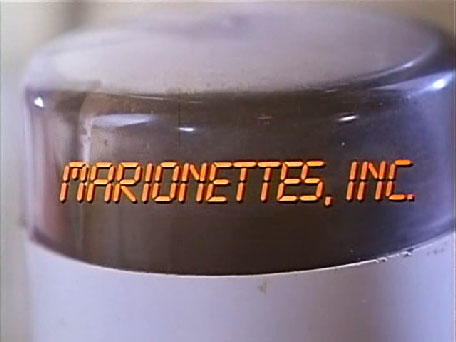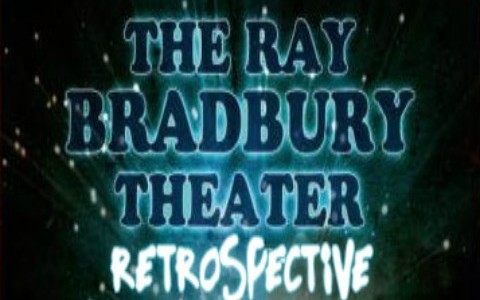I was quite a wussy kid. I remember cowering in fear whenever the music video for Michael Jackson’s “Thriller” came on TV, and my first cinematic experience – Walter Murch’s truly bizarre RETURN TO OZ – frightened me beyond belief. It wasn’t until I was in my early teens that I started to embrace horror, as before that the sight of corn syrup and red food coloring would have me diving under the covers. So, it’s strange that some of my earliest memories are of viewing episodes of the television anthology series THE RAY BRADBURY THEATER; since it regularly featured both heady ideas, and disturbing imagery. Of course, I doubt I ever fully grasped what I was watching; but somehow the Canadian-made HBO series has had a lasting impact on my psyche.
Today, the series has been mostly forgotten. Part of the 80s anthology series revival (along with the new TWILIGHT ZONE series, TALES FROM THE DARKSIDE and the syndicated MONSTERS), it had the unique distinction of focusing entirely on the work of a single writer. Of course, Ray Bradbury wasn’t solely a horror author, so the series would hover around fantasy and science fiction; but it would be the more horrific tales that would nestle quietly into my unconscious.
It’s been more than 25 years that I’ve watched an episode of the series – and nearly a year since Bradbury’s death at the age of 91 – so I thought it would be fun to revisit the episodes – many of which feature familiar actors and directors – and see if they still have the power to chill, entertain and enlighten. I’m bringing both the weight of age, my experience with the genre(s) and my usual note of cynicism with me, but I’m prepared to retreat back to my days of G.I. Joe figures and stuffed animals and watch it from the perspective of a nervous, nerdy child.

Episode 1 – Marionettes, Inc.
Originally aired: May 21st, 1985
Directed by: Paul Lynch (Prom Night (1980), Humongous (1982))
Featuring: James Coco (A New Leaf (1971), Man of La Mancha (1972)), Leslie Neilsen (Forbidden Planet (1956), Airplane! (1980), The Naked Gun: From the Files of Police Squad (1988)), Kenneth Welsh (The Aviator (1999), Twin Peaks (1990-1991))
Based on: “Marionettes, Inc.” by Ray Bradbury from his collection of short stories, The Illustrated Man.
Ray Bradbury’s short story “Marionettes, Inc” is a quietly chilling example of men using technology to escape from their relationship responsibilities. Two men converse about a new service; the titular Marionettes, Inc., that can provide exact robotic copies of anyone, identified only by the Tick-tick-tick of their mechanical hearts. The first man, Braling, is using the service to find relief from his loveless marriage; planning to fly to Rio while the doppelganger Braling Two tends to his wife’s needs. His friend Smith has the opposite problem, with a wife that is so full of love and devotion that he feels smothered by her affections. He, too, dreams of purchasing a duplicate that can get him some breathing room. The two men eventually discover that freedom can come at a great price, with two climaxes both hitting an eerie, memorable note.
The tale is dramatized – and fleshed out – by Bradbury himself in the first episode of The Ray Bradbury theater, with PROM NIGHT director Paul Lynch handling the reigns of a thirty minutes that keeps the broad strokes (and climax) of the original tale, but adds an extra layer of technological paranoia. James Coco plays Braling, who in this case (like Smith in the original story) is dealing with a clingy, impossibly courteous wife – demonstrated by a comic opening scene which finds her nearly force-feeding his breakfast to him before sending him onto work. Braling works at a computer company (we get glimpses of his quaint suitcase computer a few times), and is soon plagued by incessant advertisements for the titular Marionettes Inc. – some of which include all of his own personal details; from favorite hobbies to his private birthmark.
A paranoid Braling confesses his fears to his friend Crane (Kenneth Welsh), who suggests he investigate the company further and ask them to cease and desist. When he arrives at the futuristic office, he finds Fantoccini (Leslie Neilsen, featuring an Italian accent), who offers him an opportunity to retreat from his oppressive life with one of their life-like products. These mysterious, impossibly powerful companies which provide a Faustian bargain pop up again and again in horror and science fiction. Think CRS in David Fincher’s THE GAME. While initially terrified at the prospect, Braling eventually relents and after enjoying himself for a week he decides to tell his friend Crane about the experience. From here, the film mostly follows the plot of the short story, though with the spouses reversed. Even with the extended running time, the climax of Bradbury’s story still packs a punch.
Each episode begins with Ray Bradbury himself entering his study as a voice-over explains his creative process; an opening that I’ve always thought must have been a big influence on the hilarious British series GARTH MARENGHI’S DARKPLACE. I remember as a child finding this kickoff, with its creepy music and the office’s bizarre surroundings, to be entirely unnerving. As an adult it’s actually rather charming; as is the episode as a whole. While Neilsen is a bit difficult to take seriously in any post-AIRPLANE! role, everyone handles the science fiction conceit believably, with Coco giving a fine, balanced performance as both Braling and Braling Two. Lynch’s direction isn’t particularly notable, though he does manage the doubling of actors (with both their original and copy onscreen simultaneously) capably, and guides the whole production with confidence. A fine start to the series, if not entirely memorable.
I should note that the same story was also dramatized as “Design For Loving” in Season 4, Episode 6 of ALFRED HITCHCOCK PRESENTS, with Norman Lloyd as Braling and Elliott Reid as Smith.

Episode 2 – The Playground
Originally aired: June 4th, 1985
Directed by: William Fruet (Spasms (1983), Killer Party (1986))
Featuring: William Shatner (Star Trek: The Motion Picture (1979), Kingdom of the Spiders (1977)), Kate Trotter (Joshua Then and Now (1985))
Based on: “The Playground” by Ray Bradbury which appears in the hardcover edition of Fahrenheit 451 and in The Stories of Ray Bradbury.
Unlike the first episode, “The Playground” strays much further from the plot and themes of its source short story. The original tale positions Charles Underhill as an overprotective father, desperate to keep his son Jim from spending time at the local playground. Charles is haunted by the memories of the taunting he received as a child, and his wife’s death has made him intensely sensitive to the rough nature of childhood. Things take a turn for the supernatural when Charles encounters Tommy, the son of his friend Tom, who claims have switched bodies with his father. Tom wanted to save his son “all that torture”, just as Charles does, and offers him the opportunity to take his son’s place in the “hell” of the playground.
Once again written by Bradbury, the television dramatization relies much heavier on the image of dead-eyed, nearly-demonic children moving together in a violent cacophony. The playground itself is a brown, dust-swept prison of equipment that looks like something out of A NIGHTMARE ON ELM STREET. In this version Charles Underhill (both under AND overplayed by William Shatner) still has nightmares of his own torturous childhood, most notably a childhood bully that would intimidate and attack him on the playground. Underhill is still grieving over his late wife, but he’s shown to be impossibly meek in his job as an insurance salesman – unable to compete with the dog-eat-dog nature of the business.
Much of the first half plays out similarly to the story, but instead of repeatedly seeing a vision of Tommy on the playground slide, Charles has visions of his own childhood bully appearing and sliding down the twisting slide before vanishing. While in the story there is a suggestion that much of the dark nature of the playground is in Underhill’s psyche, here there is obviously something off about the park; with children turning to stare at Charles (and his son Steve) in CHILDREN OF THE CORN unison when he protests their behavior. The eventual ending misses the impact of its source, though it does feature some of Shatner’s trademark hammy acting as he climbs the children’s slide – putting himself at the mercy of the throngs of children that surround him.
There’s a great moment in the episode where Charles, focusing on the children in the playground, sees a series of violent incidents playing out all over. Children falling on their faces; roughhousing, and just generally being violent and awful. It’s shot from Underhill’s perspective, as a terrifying vision of the future for his own son; but it also accurately reflects how resilient and physical being a child really is. While director William Fruet sometimes leans a little heavily on the scary elements (the children are shown to alternately be zombie and feral-like) he beautifully captures the otherworldly nature of the location as described in Bradbury’s story. While the introduction of the childhood bully element illuminates the message unpleasantly, it’s a brisk watch that shows some of the potential for horror that the series holds.
DOUG “SWEETBACK” TILLEY
- [THE BIG QUESTION] WHAT’S YOUR FAVORITE FEMALE ENSEMBLE IN MOVIES? - July 22, 2016
- [IN THEATERS NOW] THE BOY (2016) - January 24, 2016
- Cult Movie Mania Releases Lucio Fulci Limited Edition VHS Sets - January 5, 2016






No Comments